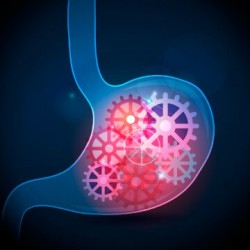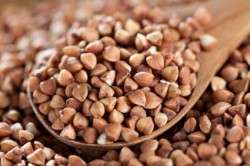Improves Digestion
Home » Improves Digestion
Looking forward to seeing you at the Markets!
It has prebiotic potential
Prebiotics are non-digestible food ingredients that stimulate the growth and/or activity of beneficial gut bacteria in our digestive systems.
In 2003, a study out of Madrid, Spain looked at buckwheat’s high nutrient levels to determine whether it could behave as a prebiotic and be considered a healthy food.
Not only did the buckwheat-fed group emerge with a lower bodyweight when compared to the control, some of the best types of helpful bacteria were also found, along with a decrease in some types of pathogenic bacteria.
Because prebiotics act in your intestines, they have a profound effect on the pathogens and bad bacteria in your body that can cause disease. Prebiotics can be used to treat Irritable Bowel Syndrome and Crohn’s Disease. Get more prebiotics in your life by using buckwheat as a base grain in your nourish bowls, like this one below.

Supports digestive health
Buckwheat has high content of fiber that adds bulk to bowel movements which helps to eliminate them through digestive tract and stimulates peristaltic motion which is the muscle contraction of intestines.
Fiber keeps consistency in bowel movements and lowers the chances of gastrointestinal problems such as gastric cancer and colon cancer. It lowers diarrhea and irritable bowel syndrome. Buckwheat suppresses appetite and lowers the chances of overconsumption. The daily intake of meals leads to regular bowel movements and maintains healthy digestive system.

High Fiber Content Helps Improve Digestion
Buckwheat nutrition supplies about six grams of dietary fiber in every one cup serving, which helps to fill you up and hastens the transit of food through the digestive tract (important for regulating bowel movements). Buckwheat can even protect the digestive organs from cancer, infection and other negative symptoms by preventing oxidative stress within the digestive tract.
When researchers from the Department of Food and Nutrition at Bucheon University in Korea tested the effects of buckwheat in animal studies, they observed higher antioxidant activities in the liver, colon and rectum of animals consuming buckwheat. Protective glutathione peroxidase and glutathione S-transferase antioxidants were all found in the digestive systems of the animals receiving buckwheat.
When buckwheat is fermented to create alcoholic drinks or certain types of sourdough bread, it can also supply valuable probiotics that nourish the digestive tract by transporting healthy bacteria into the gut flora. Studies show that consuming fermented buckwheat products can improve the body’s pH level, or the balance between acidity and alkalinity that keeps harmful bacteria and disease from forming.

Great for digestion
Because of it being an insoluble fibrous food, buckwheat is essential for cleaning and strengthening intestines. Insoluble fibre also reduces the secretion of bile acids and lowers triglycerides (blood fats). This is particularly good for those suffering with IBS-D, or anybody who has stomach trouble immediately after consuming foods.

It has prebiotic potential
Prebiotics are non-digestible food ingredients that stimulate the growth and/or activity of beneficial gut bacteria in our digestive systems.
In 2003, a study out of Madrid, Spain looked at buckwheat’s high nutrient levels to determine whether it could behave as a prebiotic and be considered a healthy food.
Not only did the buckwheat-fed group emerge with a lower bodyweight when compared to the control, some of the best types of helpful bacteria were also found, along with a decrease in some types of pathogenic bacteria.
Because prebiotics act in your intestines, they have a profound effect on the pathogens and bad bacteria in your body that can cause disease. Prebiotics can be used to treat Irritable Bowel Syndrome and Crohn’s Disease. Get more prebiotics in your life by using buckwheat as a base grain in your nourish bowls, like this one below.

Reduce your chances of more serious gastrointestinal issues
In terms of digestive aids, buckwheat is one of the best plants out there! Buckwheat has a high level of fiber, which adds bulk to your bowel movements, helping to move them through the digestive tract, and stimulating peristaltic motion, the muscle contraction of your intestines.
Fiber can reduce your chances of more serious gastrointestinal issues, even colon, and gastric cancer. It can also help to reduce irritable bowel syndrome (IBS) and diarrhea. Buckwheat’s large bulk versus actual caloric impact makes it a food where you don’t need to limit yourself in terms of amount. Not that you will need to worry, since buckwheat also acts as an appetite suppressant, and reduces your chances of overeating.






